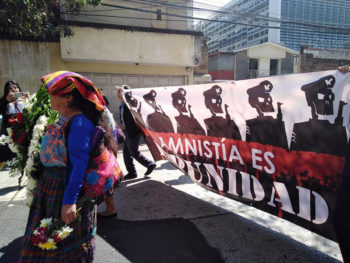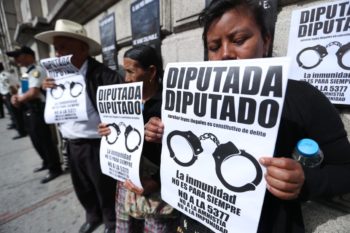When studying Guatemala, one of the questions that arises is why a small country, with extraordinary wealth and unique ethnic diversity in Central America, which is home to more than eight million women and men from 22 Mayan peoples, plus the Garífuna and Xinca peoples, with great linguistic wealth, is stuck in deep and rising poverty, driving the young to the cities and to Mexico, the United States, Canada or any other country that allows them to survive?
And why, with a Mayan majority, do they not organize and elect a president to represent them and a Congress with proven deputies who will develop a Constitution that responds to the majority of the country—the one that, through its hard work, built the few but multimillion-dollar fortunes of the Guatemalan bourgeoisie?
These questions do not have simple answers. To explain the reasons for the historical oppression of the indigenous majorities, we must study how and who founded the Nation-State and how their descendants continue to control the State today to become the most conservative, racist, hoarding, insatiable and extractive elite in Latin America. A group that boasts of its wealth while global organizations document how more than 50 percent of indigenous children are malnourished.
 This elite did not achieve its economic, political, cultural and social control alone. It had to create institutions and servile bureaucracies. One of those institutions is the army. During the last genocide, from the mid-1970s to the end of 1980, the army was used to protect the economic interests of the bourgeoisie. Financed with taxes from the U.S. and Guatemalan people, it didn’t care if that meant committing genocide, or enforcing sexual and domestic slavery of indigenous women, from girls to old women, or carrying out crimes against humanity.
This elite did not achieve its economic, political, cultural and social control alone. It had to create institutions and servile bureaucracies. One of those institutions is the army. During the last genocide, from the mid-1970s to the end of 1980, the army was used to protect the economic interests of the bourgeoisie. Financed with taxes from the U.S. and Guatemalan people, it didn’t care if that meant committing genocide, or enforcing sexual and domestic slavery of indigenous women, from girls to old women, or carrying out crimes against humanity.
Today the elite, alongside the current government of Jimmy Morales, has consistently pressured the Congress – another of the pillars of the democratic system, now converted into an institution at the service of impunity – to reform the Law of National Reconciliation to grant amnesty to the military that during the war took care of their companies, farms and families, regardless of the human cost.
Why do government, the military and the elite seek to reform this law? Because from before the signing of peace in 1996, the survivors of genocidal violence and the brutal annihilation directed by the State through the army have made significant progress within the framework of transitional justice.
Here are some examples:
* The tenacious 15-year struggle of the Ixil People resulted in national courts finally sentencing the dictator José Efraín Ríos Montt to 80 years in prison for genocide against the Ixil People, in 2013. Although 10 days later the Constitutional Court—an institution composed of magistrates tied to the military and the elite–annulled the sentence for alleged “procedural errors”, the victory was historic.
* A group of 15 Q’eqchi’ women from the communities of Sepur Zarco, Izabal, who survived the forced disappearance or murder of their husbands and sexual and domestic slavery, managed to get two members of the army condemned to more than 100 years in prison, for murder, sexual violence, domestic slavery and crimes against humanity in 2016.
* In 2018, the Molina Theissen family won the conviction of the members of the military leadership that governed Guatemala in the 1980s for the forced disappearance of the family’s youngest son, a child when he was kidnapped in his home. The members were also convicted of illegal detention, sexual violence and torture against one of the daughters when she was a teenager.
The above are some of the best-known cases, but they are not the only ones that have sought to advance the justice system in the face of genocide and crimes against humanity.
______________________________________________________________
“The 5377 initiative represents a setback for survivors’ rights, including the complainants in cases that are now open.”
__________________________________________________________
Faced with these achievements, the Congress–now turned into an institution defending impunity—has responded by seeking to approve a bill (5377) to modify the National Reconciliation Law. If this initiative is approved, which has already passed two readings on the floor and has to pass only one more, it would mean amnesty for all cases of human rights violations and crimes committed during the internal armed conflict that have been tried and condemned in Guatemalan courts.
According to the High Commissioner for Human Rights, Michelle Bachelet, “The approval [of this initiative] would paralyze ongoing investigations related to violations of fundamental guarantees, and would be retroactive and would lead to the immediate release, in 24 hours, of people convicted and imprisoned ‘for serious violations of human rights’ “.
 The 5377 initiative represents a setback for the rights of the survivors, including the complainants in cases that are now open. It would also be a violation of international law and generate reprisals against the victims, the survivors, the judges who have tried these crimes, the prosecutors, the experts who participated in the trials and the members of the social organizations that have promoted justice. Guatemalan civil society and the Inter-American Court of Human Rights have expressed their rejection of the initiative.
The 5377 initiative represents a setback for the rights of the survivors, including the complainants in cases that are now open. It would also be a violation of international law and generate reprisals against the victims, the survivors, the judges who have tried these crimes, the prosecutors, the experts who participated in the trials and the members of the social organizations that have promoted justice. Guatemalan civil society and the Inter-American Court of Human Rights have expressed their rejection of the initiative.
The process of seeking amnesty reveals that the peace negotiations, began in the late 1980s, were carried out in a context of economic, political and military elites that left the high command immune. But that immunity began to fall apart when organized demands for transitional justice began to touch the masterminds of war crimes.
As the historian María Aguilar wrote: “The case of Myrna Mack was among the first to investigate the masterminds, although it failed to demonstrate the chain of command in the upper ranks. However, the genocide trial against Efraín Ríos Montt in 2013 achieved that. That’s why the genocide trial represented a watershed for transitional justice. Not only because of the jurisprudence that it introduced, but because it marked the moment when the military regrouped to organize a new offensive against the movements for the respect of human rights and access to justice. “(El Periódico Marzo 18, 2019)
Today the battle is in Congress, and the deputies who serve impunity, regardless of the violation of international treaties, are doing everything they can to approve the amendments to the National Reconciliation Law and guarantee impunity to the military, politicians, magistrates, judges and the Guatemalan elite, whose hands are stained with blood.



